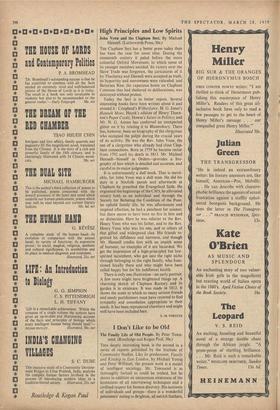High Principles and Low Spirits
John Venn and the Clapham Sect. By Michael Hennell. (Lutterworth Press, 30s.)
THE Clapham Sect has a better press today than has been the case for some time. During the nineteenth century it paled before the more colourful Oxford Movement, to which some of its younger members seceded. Its victory over the Slave Trade was forgotten, the caricatures of it by Thackeray and Disraeli were accepted as truth, its hypocrisy and narrowness were ridiculed, and Battersea Rise, the capacious home on Clapham Common that had sheltered its deliberations, was destroyed without protest.
Today the Sect is in better repute. Several interesting books have been written about it and around it : Coupland's Wilberforce, M. G. Jones's Hannah More, Hayek's edition of Henry Thorn- ton's Paper Credit, Howse's Saints in Politics; and Mr. N. G. Annan has conferred an unexpected glitter on it by relating it to Bloomsbury. There has, however, been no biography of the clergyman who occupied the pulpit during the crucial years of its activity. He was the Rev. John Venn, the son of a clergyman who already had close Clap- ham connections. Born in 1759 he became rector from 1792 until his death in 1813. Mr. Michael Hennell—himself in Orders—provides a bio- graphy of him which is detailed and accurate, and careful in its major judgments.
It is unfortunately a dull book. That is inevit- able, for John Venn was a dull man. He did his duty in a Norfolk parish and afterwards at Clapham he preached the Evangelical faith. He organised the beginnings of the CMS, he alleviated misery both as an individual and through the Society for Bettering the Condition of the Poor, he upheld family life, he was affectionate and inspired affection, he had a penchant for science; but there seems to have been no fire in him and no distinction. Here he was inferior to the Rev. Henry Venn who was his father, and to the Rev. Henry Venn who was his son, and to others of that gifted and widespread clan. His friends re- gretted his diffidence and inertness, and though Mr. Hennell credits him with an impish sense of humour, no examples of it are hazarded. We get the impression of a high-principled but low- spirited incumbent, who got into the right niche through belonging to the right family, who func- tioned loyally there and who might have been called happy but for his indifferent health.
There is only one illustration—an early portrait. A few more might have brightened things up. A charming sketch of Clapham Rectory and its garden is in existence. It was made in 1812. It shows the scene to which so many serious friends and needy parishioners must have resorted to find sympathy and consolation appropriate to their needs. It has been reproduced elsewhere and might well have been included here.
E. M. FORSTER










































 Previous page
Previous page